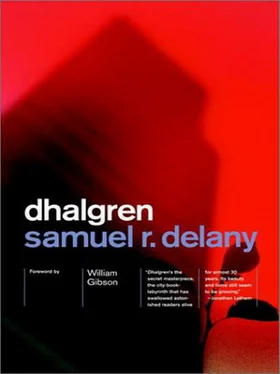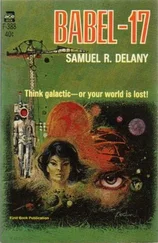Mrs. Arthur Richards
The Labry Apartments (#17-E)
400, 36th Street
Bellona, U.S.A.
The return address, written in the same hand (both in green ink):
Ms. Julia Harrington
7 Lilac Vista
Los Angeles 6, California
The letter itself has either been removed, or lost.
When I came up the stairs, her office door was closed. So I wandered from the study to the kitchen into Lanya's room and back. Finally I sat on the edge of the desk in the hall, tilted the Newboy volumes from between the statuettes, piled them beside me, and began to flip pages.
Which was funny: after five minutes I still hadn't read one whole poem, or one complete paragraph from the essays or stories. My eyes could only focus before or behind the page. That part of the brain, directly behind the eye, that refracts the jewelry of words into image, idea, or information, wouldn't work. (I even wondered a while how much of that was because I'd heard him speak.) The books had generated ghosts of themselves, and I couldn't read the words for their after-images. I kept picking up different volumes, hefting them, closed, on my palm, putting them down, then hefting my emptied palm again, feeling for the ghost's weight. My stomach began to hurt because I was concentrating so widely. I put them all back — first I ordered them by size, then I pulled them out again and reordered them by the dates on the copyright pages — and walked for a while (remember the fourth day on speed?), returning to the desk, pulling the books out again, leaving — really finding I'd wandered away just as I'd turn around to go back.
What is it around these objects that vibrates so much the objects themselves vanish? A field, cast by the name of a man, who, without my ever having read a complete work of his, the hidden machinery of my consciousness at some point decided was an artist. How comical, sad, exhausting. Why am I a victim of this magic? But for all I recognize out of me, I wonder furiously who would hold Brass Orchids on their hand, hefting for noumenal weight?
"Kid?" Madame Brown's body and face were sliced by the door. "You're here. Good."
"Hello." I closed the The Charterhouse of Ballarat. "You ready for me to come in now?"
She opened the door the rest of the way; I got off the desk.
"Yes, let's begin. I hope I didn't keep you waiting…?"
"That's okay." I walked into the room.
Coming in to the dull green walls, dark wood up to the waist, a day bed with a green corduroy spread, three big leather chairs, a tall bookshelf, dark green drapes, I had to readjust my spatial model of the house: It was the biggest room on the floor and I'd never been in it.
On the wall was a swing-out display rack, like in poster shops. I walked over, started to open it, glanced at Madame Brown—
"Go ahead."
— and turned the first leaf, expecting George:
The raddled earth hung above tilted, lunar shale. On the next, a bulky astronaut stared out his half-silvered faceplate. All the pictures — I went through some dozen — were of the moon, or Mars, or the familiar faces of astronauts, necks ringed with helmet clamps — two of a younger, closer-cropped Kamp — or their polished angular equipment (the foil-wrapped module foot under which Kamp's moon-mouse had fled), plastic flags, or pale, cirrus clouds, hind-lit by exhaust-light as the rocket rose above its stanchions.
Let Kamp smirk out on our session? No, I turned to a chalky scape, backed by an earth with clouds like a negative thumb-print. Or a saucepan of soured milk a moment before it boils; and went to a chair.
"Comfortable there?" Madame Brown closed the door. "You can lie down on the couch if it's easier for you to talk that way."
"No. I'd rather see you."
She smiled. "Good. And I'd rather see you." She sat in one of the other chairs at a slight angle to me, a hand on the arm, a hand in her lap. "How do you feel about talking to me?"
"A little nervous," I said. "I don't know why: I've talked to enough shrinks before. I was thinking, though, it's all right here because there aren't any mental hospitals left so you can put me away."
"Do you feel that the other doctors you talked to — perhaps the doctors you saw before you went into the hospital the first time — put you away?" She said that pretty openly, not with any sarcastic quotes around put you away.
But suddenly I was angry: "You don't know very much about crazy people, do you?"
"What do you want to tell me about them?"
"Look — I'm very suggestive. Labile… like they say. I incorporate things into my… reality model very quickly. Maybe too quickly. Which is what makes me crazy. But when you tell us we're sick, or treat us like we're sick, it becomes part of… me. Then I am." And I wanted to cry, at once, surprisingly, and a lot.
"What's the matter?"
I wanted to say: I hate you.
"Do you think I think you're crazy?"
"I don't… don't think you think at all!" Then I cried. It really did surprise me. I couldn't move my hands. But I lowered my head to stop what hurt in the back of my neck. Water trickled the side of my nose. Thinking: Christ, that was fast! and sniffing when the silence got on my nerves.
"Did you like the hospital where you were?"
"Like it…?" I raised my head. "You're the one who said to me…" Another tear rolled. I felt cold. "…no, you said about learning to love the people at hand? Well there were a lot of very hurt people there, who it was very hard to learn to love, very expensive — emotionally. But I guess I did."
"Why are you crying?"
"Because I don't believe in magic." I sniffed again; this time something salty the size of a clam slid back out of my nasal cavity and I swallowed it. "You're a magic person, sitting there. You're sitting there because you think you can help me."
"Do you need help?"
I was angry again. But it was deep and bubbled down below things. "I don't know. I really don't. But that doesn't have anything to do with the fact that that's what you believe."
"You're angry at me."
I took a deep breath. "Not… really." The bubbles, one after the other, broke. I absorbed the fumes that raged.
My stomach was very tight.
"It's all right if you are. You may have good reason."
"Why should…?" and stopped because I could think of about ten. I said: "You're smug. You're not sympathetic. You think you understand. And you don't…"
"I don't understand yet; and I don't know whether I'll be able to. As of now, you haven't given me any reason to be sympathetic. If I'm smug, well… I'd rather I weren't, but I can feel some reserve in myself about getting too close to you just yet; which may be what smugness is."
"I don't think you can understand." I lugged both hands together in my lap and pushed them against one another. They felt numb. So did my feet
"What do you feel like now?"
"Like not much of anything."
"Does it make you want to cry again?"
I took another breath. "No. I don't…" I put my head back. "I think I lost it, whatever was coming out…"
"Are you a very emotional person? Do you cry often?"
"That's the first crying I've done in… three years, maybe four… a long time."
She raised her eyebrow. After a moment, she said: "Then you're probably under a great deal of pressure. What kind of pressure are you under?"
"I think I'm going crazy. And I don't want to. I don't like it. I like life, I like living. I like what's going on around me, all of it to watch, and most of it to do. There're all sorts of people and situations around I really enjoy. And I'm at a place where I don't have to worry about all sorts of others I don't. I don't want to go nuts again. Not now."
Читать дальше












